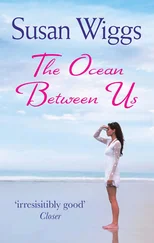Daisy Bellamy loved weddings. She always had, ever since she was little and got to be the flower girl in her aunt Helen’s wedding. She still remembered the lacy dress, the flowers twining through her hair, the shiny patent-leather Mary Janes, the feeling that she had a critically important role to play.
Taking a break from her dad’s wedding festivities, she sat on the balcony of her hotel room, looking down at the pavilion that had been set up on the beach for the reception. Sunset painted the sky every color of the rainbow. In a few minutes, she’d take out her camera to get some candid shots of the party.
All her life, she had fantasized about the day it would be her turn to be the bride. She had actually planned the entire event, right down to the seed pearls on her gown. She could perfectly picture every moment of her special day, from the delivery of the flowers—daisies, what else?—to the roaring send-off, to the Parisian honeymoon.
The only detail she couldn’t picture was the face of the groom.
At nineteen, she still couldn’t help dreaming about her own wedding, but there was a difference now. It was only a dream, not an eventuality. That option had been taken off the table last August.
She glanced down at the infant nursing at her breast and knew that the fantasy wedding simply wasn’t going to happen. Unless Prince Charming was willing to take on Daisy and Charlie both.
Logan O’Donnell, the baby’s father, kept trying to convince her that he was the one. There was one problem with that. Logan wasn’t Prince Charming. Oh, he looked like a prince, which was what had landed Daisy in trouble in the first place. But now that reality had hit Daisy like a brick to the head, she knew it took a lot more than looks to make a prince.
She lifted Charlie against her and draped a cloth over her shoulder to catch the spit-up, which was his custom after every meal. Thanks to Charlie, she had missed the very tail end of the wedding. He’d been great right up until the final reading. She’d promised her dad and Nina that she wouldn’t let him interrupt and, true to her word, she’d whisked him away at the first squawk.
Now she rubbed the baby’s back, standing up and swaying back and forth on the balcony. “We don’t need a prince, do we?” she whispered in his ear. “We just need to fantasize about something different. I’ve been meaning to talk to you about that. I mean, I know you’re really little, but I wonder if you’d mind staying with a babysitter for a few hours a week while I take a photography course at the college.”
He rewarded her with a gentle belch.
Daisy smiled. “That’s right, I got in. My portfolio was approved for the class, and it all starts in a few weeks. I’m going to feel totally guilty about leaving you, though. Mom left Max and me a lot when we were little. She had to, because of her work. I wonder if she felt like this, too. Just totally guilty—”
“Hey, Daisy!” Standing two stories below, Sonnet Romano waved at her. “Come on down. They’re about to cut the cake.”
“Don’t let them start without me,” Daisy called.
“You want some help?”
“That’s okay. We’ll be right there.”
Nina’s daughter Sonnet was the first friend Daisy had made in Avalon, New York, where they’d moved after Daisy’s parents divorced. She was the first person Daisy had told, after her dad, about being pregnant. Now Sonnet and Daisy were stepsisters. She hoped that didn’t mean the end of a beautiful friendship.
“You hear that?” Daisy said to Charlie as she put her camera into the ever-present diaper bag. “Cake! I love cake.” One of the best things about breastfeeding was that you could eat anything you wanted—cake, peanut butter, cookie dough, you name it—and you didn’t gain weight, because it took a lot of calories to be a milk factory.
She buckled the baby into his carrier and headed out the door. The hotel had open-air hallways and stairwells, and a warm breeze flowed through, carrying the scent of exotic flowers. Here in the tropics, winter seemed a million miles away.
At the bottom of the stairs, she headed toward the reception, but stopped when she saw Max running toward her.
She took one look at her brother’s face and knew something was wrong. Well, whatever it was, they weren’t going to bug Dad about it. Not today, of all days.

Three weeks later
Every act you have ever performed since the day you were born was performed because you wanted something.
—Andrew Carnegie, founding contributor of the Peace Palace

The Hague, Holland
Three weeks later
While waiting for Tariq in the courtyard of the Peace Palace, Sophie turned in a slow circle, waiting for the flashbacks to hit like a bolt from the sky. She’d been told by her post-trauma treatment team to expect unsettling reminders of the ordeal she’d suffered here. But nothing happened, not even when she thought about André staggering toward her, bleeding into the snow. She felt a wave of grief, but no panic, no insanity. The sky remained its usual brooding gray. The neo-Gothic walls of the palace, stained by age and pollution, looked the same as they always had, coldly beautiful and impenetrable.
This was not the first time she’d come here in the past few weeks. She’d been brought here several times, as her doctors wanted to be sure the location did not trigger any sort of trauma-induced reaction. On the contrary, she felt nothing but the usual bone-deep dampness of a typical winter day.
The screen of her PDA displayed a text message from Max sent the day before. Dad taking us skiing at Saddle Mt 2day. Wish U were here xoxo. She checked her watch, which was always set at her children’s time zone, and deemed it too early to phone the States. There would be time to call after her meeting today to tell them her plans.
A moment later, Tariq joined her, his Burberry greatcoat swirling fashionably in the wind. Like Sophie, he was shadowed by security agents, whose constant presence was a given these days.
“You look remarkably calm,” said Tariq.
They set off together to a meeting at the supreme chamber. Sophie eyed him with a slight frown. “Why do you say ‘remarkably calm’? Why not just calm?”
“No one would blame you for not wanting to set foot in this place. After what happened to you—”
“I swear, if I hear that phrase one more time … And what about you? It happened to you, too.”
He waved away her comment. “I’ve survived worse than a bloodied nose. Besides, being unconscious is my preferred way of enduring an attack.” He paused in the colonnaded hallway and touched her arm. “I wish you’d been spared as I was.”
Three weeks had passed since the incident. That was how the events on the night of Epiphany had come to be known—the incident. Or, The Incident. The Epiphany Incident, referred to in somber tones by foreign correspondents. The London Times had called it the Twelfth Night Massacre. But there was no term that could encompass the terror and powerlessness of that night until it became a code word—The Incident.
She had walked away from death that night, soaked to the skin but feeling nothing. Hypothermia created such symptoms, the doctors later told her. The body went numb to protect itself from damage. So, in a way, had her mind. Her memory of the ordeal was fragmented. Sometimes, in her nightmares, she relived the ordeal in terrifying bursts. There was the weightlessness of her free fall as the van hurtled through the night. The impact when it hit the water thundered up through the vehicle, jarring her teeth so that she bit her tongue, snapping her head back. The air was filled with screams and howls that sounded almost animallike. Water flooded the van from front to back, and she felt herself swept backward; her captors hadn’t bothered to fasten her seat belt.
Читать дальше













